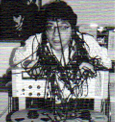 by Dennis Daniel
by Dennis Daniel
Two issues ago I began discussing becoming involved in the teaching arena. (Boy, that sounds impressive and classy.) To briefly recap: I called a local vocational school called The Audio Recording And Technology Institute (ARTI) and suggested the idea of teaching a course in radio production right here at WDRE. They loved the idea. I checked it all out with the owner and GM -- no problem. ARTI asked me to come up with a ten week course. I'm reprinting it here for you just in case you need to use it in some form for presentation to a school near you.
COURSE OUTLINE
RADIO COMMERCIAL/PROMO PRODUCTION/"THEATER OF THE MIND"
LENGTH: 10 Week Course
TIME: Wednesdays, 7 to 9 PM
PLACE: WDRE, 1600 Stewart Ave., Westbury
INSTRUCTOR: Dennis Daniel
WEEK ONE: An introduction to the concept of radio production as theater of the mind. Students will listen to various examples of radio production (both commercials and station promotions). There will be an overall discussion about what makes an effective commercial/promo. Students will be asked to write one commercial and one promo.
WEEK TWO: Instructor will go over each individual written assignment in front of the class, pointing out common mistakes and cliches. One commercial and one promo will be chosen for rewriting and eventual production that evening by instructor. Students will watch overall technique used to bring copy to life. Students will be asked to write a new commercial and promo for the following week.
WEEK THREE: Instructor will go over individual writing assignments. Once again, two will be chosen for production that evening. This time, board operation will be taught as the two pieces are being produced.
WEEK FOUR: Board operation will be reviewed. Lesson will be taught about the many different writing approaches to commercials and promos. Students, along with instructor, will write and produce a commercial that evening, using the methods previously discussed.
WEEK FIVE: Board Operation will be reviewed. A lesson will be taught about radio station drop-ins, sweeps, and legal Ids. Several of these will be produced that evening by instructor and students together.
WEEK SIX: If still needed, board operation will be reviewed. Students will learn how to produce concert commercials, including the proper ways of mixing music to voice. A concert commercial will be produced that evening. Students will be asked to write a one-minute theater of the mind piece. Piece can be anything from a comedy sketch, to a commercial, to just a sound piece.
WEEK SEVEN: Instructor will review written pieces. One will be chosen for production that evening by the students, with instructor looking on. The concept of a group production will be put to test, with board operation, acting, FX and direction assignments.
WEEK EIGHT: Another student written theater of the mind piece will be produced by students with instructor looking on. A lesson will be taught about how to get into the radio business and the many avenues available for students to take. Two teams of students will be chosen to write and produce one commercial and one promo. (Scripts may be provided by instructor or written by student, depending on the quality of previously written scripts.) The commercial and promo will determine the grade of each student. Team one will produce their commercial and promo on week nine. Team two on week ten.
WEEK NINE: Team one will produce commercial and promo and receive grade.
WEEK TEN: Team two will produce commercial and promo and receive grade.
During the ten week course, guest speakers from WDRE (when available) will come in and speak about the many different aspects of radio production and how it effects their departments (specifically, the General Manager, Promotion Director, Programming Director, Staff Writer and Engineering Director).
There is also the very real chance of writing and producing commercials, promos, drops, Legal ID's and sweeps for WDRE for on air use. (This all depends on the class and how far the students develop.)
Teaching is a wonderful way to stay creatively sharp and experience the joy of sharing knowledge. (There's another phrase that sounds hackneyed but true.) Plus, if your students have talent, it gives you lots of new voices, ideas and approaches. You really can get them on the air! If you'd like to know what kind of financial arrangements I made with the school to give you an idea of what to charge, write or call me anytime. Next month: "Why you should never burn bridges."
♦

